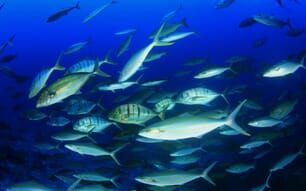A workshop that included Government, economics experts and representatives from the commercial fishing and angling sectors, was held following another report published last year which made comparisons on sea bass fishing in Sussex.
The report, issued by Seafish on behalf of UKFEN, evaluates and recommends different economic analysis methods for comparing the value of industry sectors and informing policy questions about allocation of resources to achieve efficiency or fairness of distribution of quotas.
It also looks at other important elements, such as resource allocation, economic efficiency and distributional policy, distinguishing between political objectives, social justice, fairness, benefit maximisation and economic efficiency.
All sectors involved in the workshop have backed the report, including the angling sector, representatives from government, and the commercial fishing sector.
Crucially, when comparing sectors, the UKFEN report found that while total value estimates give a snapshot of actual relative contributions to the economy, the results do not represent the likely consequences of stopping a particular activity.
The report points out that even when a study finds that more jobs and economic benefits arise from one type of fishing, rather than another, this finding reveals nothing about the marginal benefits of shifting stock allocations between sectors.
Seafish organised and funded the workshop, with the intention that the report could provide guidance on valid methods to compare sector or industry values and highlight comparisons that are invalid or wrongly interpreted, ultimately to help inform decisions that affect the fishing industry.
Chief Economist at Seafish, Hazel Curtis, said: “Economists are frequently asked to compare the economic importance of the commercial fishing sector to the economic importance of recreational sea angling, but for economic impact analysis of different activities, comparing like with like can be very challenging.
“Static analysis about the value of sectors does not inform adequately about the likely effects of policy change or reallocation of fishing rights between commercial and recreational fishing, so the purpose of our report is to provide policy makers with appropriate analysis and ensure they feel confident with the economic information to make informed decisions.
“We hope that the report will help ensure that the most appropriate analyses are prepared given the policy context and will reduce time and effort debating the merits of the economic analyses so that there could be more time to spend on the wider policy debate itself”.
Dale Rodmell, of the National Federation of Fishermen’s Organisations (NFFO), contributed to the workshop and said: “Too often inappropriate comparisons of value are made within poorly defined contexts or for divisive purposes. This report is a welcome contribution that sheds light and understanding on what is meant by different measures of economic value and on how they should be applied.”
Nigel Horsman, of BASS, the Bass Anglers’ Sportfishing Society, attended the workshop and said the report is “an excellent piece of work that deserves very careful reading by everyone involved in fisheries management, policy setting, stakeholders and anyone else with an interest in the subject. I hope it is read slowly and fully as I found important statements throughout. There is much to be gained from taking action to achieve better fisheries management.”



